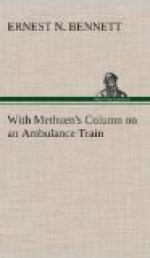The bells of the Cathedral tolled mournfully as the old year died. Would that its bitter memories could have perished with it! And then from steeple and steamship, locomotive and factory, a babel of sound burst forth as sirens and bells and whistles welcomed the birth of 1900. Yet, as the shrill greetings died away, one heard the tramp of infantry through the streets. The Capetown Highlanders—a volunteer battalion—were under arms all that night, as a rising of the Dutch had been anticipated on New Year’s Day. May the new year see the end of this cruel strife, and the sun of righteousness arise upon this unhappy land with healing in his wings! As one sits in the dimly-lit wards while the train tears through the darkness, and nothing breaks the silence save the groan of a wounded man or the cries of some poor fellow racked with rheumatic fever—at times like these one thinks of many things, past, present and future. An ever-deepening gloom of military disaster seemed to be spreading itself around us—Magersfontein, Stormberg and the latest repulse on the Tugela, a veritable [Greek: trikumia kakon]! Of course, in the long run, we shall and must win. But what afterwards? Will the vanquished Dutch submit and live in peace and amity with their conquerors, or will they preserve the memory of their dead from generation to generation, and cherish that unspeakable bitterness which they at present feel for England and her people? Verily all these things lie on the knees of the gods!
ABERDEEN UNIVERSITY PRESS.
FOOTNOTES:
[A] Since these lines were written Lord Roberts has personally testified to the misuse of the white flag in the Paardeberg fighting.
[B] Cf. The River War, by Winston Spencer Churchill, vol. ii., p. 394. “It is the habit of the boa-constrictor to besmear the body of its victim with a foul slime before he devours it; and there are many people in England, and perhaps elsewhere, who seem to be unable to contemplate military operations for clear political objects, unless they can cajole themselves into the belief that the enemy is utterly and hopelessly vile.”
[C] Cf. Tacitus, Agricola, xxvii.: Iniquissima haec bellorum condicio est; prospera omnes sibi vindicant, adversa uni imputantur.



